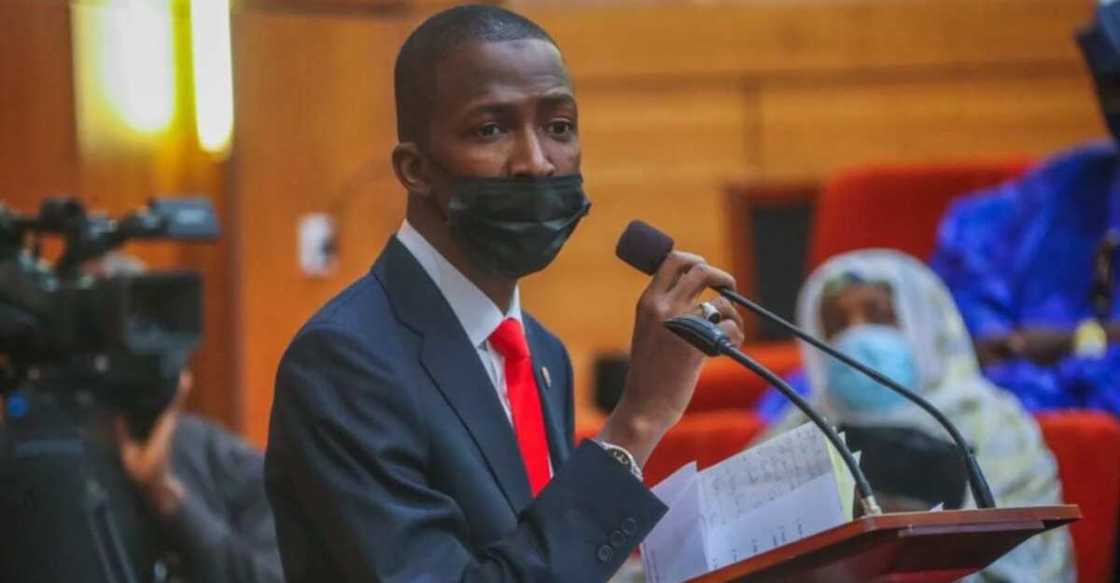EFCC Tells Nigerian Banks to Query Their Customers’ Sources of Income
- Nigerian banks have been urged to screen their potential customers to ensure that they are not recipients of slush funds
- EFCC boss, Abdulrasheed Bawa, tasked the banks to be more prudent and watchful when engaging new customers
- The financial institutions' were also warned that where there are established cases of institutional complicity in fraud, they will face the consequences
FCT, Abuja - The chairman of the Economic and Financial Crimes Commission, EFCC, Abdulrasheed Bawa, has urged banks in the country to investigate the sources of income of their potential customers before opening an account for them.
Bawa gave the advice on Tuesday, August 24 when the Association of Chief Audit Executives of Banks in Nigeria, (ACAEBIN), led by its chairman, Yinka Tiamiyu paid him a courtesy visit at the EFCC headquarters in Abuja.

Source: Facebook
Bawa implored the bank auditors to take issues of transparency in banking operations seriously.
He added that starting from Wednesday, September 1, it will no longer be business as usual, warning that the commission will hold banks liable where there are established cases of institutional complicity in fraud in the sector.
PAY ATTENTION: Install our latest app for Android, read best news on Nigeria’s #1 news app
He, however, affirmed the commission’s willingness to partner with the association in tackling financial crimes and related challenges in the banking sector.
The Guardian newspaper quoted him as saying:
“I will like to urge you to know your customers, know the kind of businesses they do before opening an account for them because some customers will open an account within a space of two months a huge sum of money is found in the account.
“So there is a need for you to try and query this information including their linked accounts.”

Read also
Nigerians react as EFFC tells commercial banks to ask for their customers' source of income
Some Nigerians on social media have been reacting to the EFCC's recent instruction to the banks.
Ojo Ibrahim wrote on Facebook:
“The federal government and all the agencies fighting corruption are biased towards the culprits. If a house harbouring kidnapers or armed robbers are detected, they either demolish the building or confiscate it and it becomes government property.
“Why are they not using the same method to either demolish or confiscate banks that money launderers or corrupt leaders are using? There's a need for such measure to checkmate both local and foreign banks that are being used by politicians and civil servants to launder money.
“That's the only way forward to stop corruption in this country. All this kangaroo approach of EFCC, ICPC, and others won't work.”
Cheerful Kachi wrote:
“This present administration and its agents derive joy from people suffering and poverty. How can you be asking people their source of money.. will you still ask people their source of poverty?”
Barida Jonas Vinom wrote:
“Banks have no such powers under Nigerian law. You know the people stealing our money.”
Meanwhile, the EFCC has sealed off a property belonging to Senator Rabiu Kwankwaso in Kano state.
Operatives of the EFCC sealed off the building as a follow up on a petition sent to the commission by some members of the family of Ismaila Gwarzo, a former national security adviser.
The family members had alleged that one Abdullahi Muazu Gwarzo, sold the property belonging to the family to Kwankwaso and refused to remit the money.
On its part, the Central Bank of Nigeria (CBN) has said it will work with the Nigeria Police Force and other law enforcement agencies to ensure that anyone found abusing the naira such as spraying notes on social occasions is prosecuted.
The apex bank spokesman, Mr Osita Nwanisobi, made this known in a statement seen by Legit.ng on Tuesday, August 17.
Nwanisobi also revealed that the EFCC will be brought onboard by the CBN in enforcing the new rule.
Source: Legit.ng



